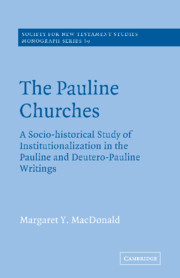 The Pauline Churches
The Pauline Churches Published online by Cambridge University Press: 10 December 2009
The preceding study of the Pauline communities has been conducted to illustrate that norms, ministry structures, ritual forms and beliefs are shaped by the realities experienced by a sect in the early stages of institutionalization. It is through the process of institutionalization that the symbolic universe is constructed. The symbolic universe may be envisioned as interacting across a dialectic with the lives it embraces. Throughout community-building institutionalization, the universe is in the process of solidifying. At this stage, much ambiguity surrounds the question of how members of the community should act and how beliefs should be interpreted. Institutionalization is relatively free to proceed in different directions. We can expect that as the body of tradition grows larger, institutionalization will become set along a more definite course. As problems of management increase, more firmly established guidelines for living will be required. When deviance becomes a problem, the universe must be maintained and further legitimation is required. In the following study of Colossians and Ephesians, we will investigate how problems of management affect development. We will trace the continued solidification and alteration of the symbolic universe in communities that appealed to the authority of the Apostle in his absence.
To save this book to your Kindle, first ensure [email protected] is added to your Approved Personal Document E-mail List under your Personal Document Settings on the Manage Your Content and Devices page of your Amazon account. Then enter the ‘name’ part of your Kindle email address below. Find out more about saving to your Kindle.
Note you can select to save to either the @free.kindle.com or @kindle.com variations. ‘@free.kindle.com’ emails are free but can only be saved to your device when it is connected to wi-fi. ‘@kindle.com’ emails can be delivered even when you are not connected to wi-fi, but note that service fees apply.
Find out more about the Kindle Personal Document Service.
To save content items to your account, please confirm that you agree to abide by our usage policies. If this is the first time you use this feature, you will be asked to authorise Cambridge Core to connect with your account. Find out more about saving content to Dropbox.
To save content items to your account, please confirm that you agree to abide by our usage policies. If this is the first time you use this feature, you will be asked to authorise Cambridge Core to connect with your account. Find out more about saving content to Google Drive.